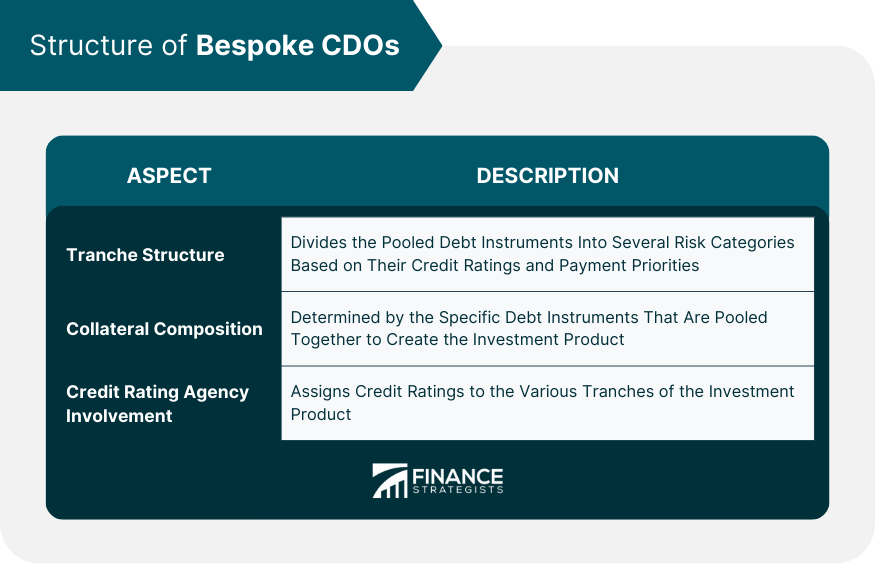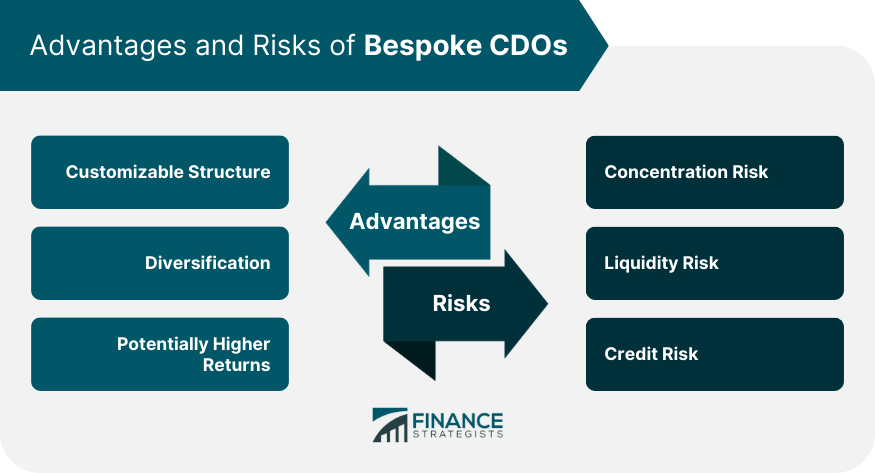A bespoke collateralized debt obligation (CDO) is a specialized financial instrument that allows investors to tailor their investment exposure to a specific portfolio of debt instruments. Bespoke CDOs are a type of structured finance product, often used by sophisticated investors to gain exposure to a range of credit risks. These tailored investments are created by pooling together a diverse set of debt securities, such as loans, bonds, or other debt instruments, which are then divided into tranches with varying levels of risk and return. The main purpose of bespoke CDOs is to provide investors with a tailored investment product that meets their specific risk and return preferences. By selecting the types of debt instruments and the risk levels of the tranches, investors can achieve a level of diversification and exposure that may be difficult or costly to obtain through individual investments. Additionally, bespoke CDOs enable the transfer of credit risk between different parties, allowing banks and other financial institutions to offload some of their credit risk to other investors. Bespoke CDOs emerged in the early 2000s as a variation of the traditional CDO market, which dates back to the late 1980s. While traditional CDOs are created by pooling together assets with similar credit characteristics, bespoke CDOs allow investors to customize the underlying collateral to their specific needs. This innovation was driven by the growing demand for tailor-made investment products, as well as the increasing complexity of financial markets. However, the bespoke CDO market faced significant challenges during the 2007-2008 financial crisis, which led to tighter regulations and reduced investor appetite for these instruments. The tranche structure of a bespoke CDO divides the pooled debt instruments into several risk categories based on their credit ratings and payment priorities. These tranches are typically ranked from the least risky, or senior, to the most risky, or equity. Investors can choose to invest in one or more tranches according to their risk tolerance and return expectations. The senior tranches have priority in receiving principal and interest payments from the underlying collateral, while the equity tranches bear the highest risk of default, offering potentially higher returns in exchange for increased risk. The collateral composition of a bespoke CDO is determined by the specific debt instruments that are pooled together to create the investment product. These debt instruments can include corporate bonds, loans, mortgage-backed securities, and other types of debt. The selection of collateral can significantly impact the risk and return profile of the bespoke CDO, as different types of debt instruments carry different levels of credit risk. Investors work with the issuer or arranger of the bespoke CDO to customize the collateral composition based on their preferences and investment objectives. Credit rating agencies play a key role in the bespoke CDO market by assigning credit ratings to the various tranches of the investment product. These ratings are intended to provide investors with an independent assessment of the credit risk associated with each tranche, helping them make informed investment decisions. The credit rating agencies evaluate the quality of the underlying collateral, the tranche structure, and the financial health of the issuer, among other factors. However, the role of credit rating agencies in the CDO market has been scrutinized following the 2007-2008 financial crisis, as some have argued that their ratings contributed to the overvaluation of certain CDOs. One of the main advantages of bespoke CDOs is their customizable structure, which allows investors to tailor the investment product to their specific needs and preferences. By selecting the types of debt instruments and tranches that best suit their risk and return objectives, investors can create a bespoke investment product that aligns with their investment strategy. This flexibility can be particularly valuable for institutional investors such as pension funds, insurance companies, and hedge funds, which may have specific investment mandates and risk management requirements. Another advantage of bespoke CDOs is their potential for diversification. By pooling together a diverse set of debt instruments, investors can spread their investment across a range of credit risks, reducing the impact of any individual default or credit event. The tranche structure of the CDO allows investors to further customize their exposure to different levels of credit risk, tailoring their risk and return profiles to their investment objectives. This diversification can be particularly beneficial in volatile market environments, where the risk of default or credit events may be higher. Bespoke CDOs may offer potentially higher returns than traditional fixed income investments, particularly for investors who are willing to take on higher levels of credit risk. The equity tranches of bespoke CDOs, which bear the highest risk of default, can offer higher returns than other fixed income investments, such as corporate bonds or government bonds. However, investors should carefully consider the risks associated with these higher returns, as the equity tranche is also the most susceptible to losses in the event of defaults or credit events. One of the main risks of bespoke CDOs is concentration risk, which arises when the investment product is heavily exposed to a particular sector, industry, or issuer. This concentration can be particularly problematic if the underlying collateral experiences credit events or defaults, as the losses may be concentrated in a few tranches or investors. Concentration risk can also limit the diversification benefits of bespoke CDOs, as investors may inadvertently become overexposed to certain credit risks. Bespoke CDOs can also present liquidity risk, as these investment products may be difficult to sell or exit in certain market environments. The illiquidity of bespoke CDOs can make it challenging for investors to adjust their exposure to credit risk, particularly in volatile market conditions. Additionally, the lack of transparency and standardization in the bespoke CDO market can exacerbate liquidity risk, as investors may struggle to value or understand the underlying collateral and tranche structure. Credit risk is another significant risk associated with bespoke CDOs, as the performance of the investment product is directly linked to the creditworthiness of the underlying collateral. If the debt instruments included in the bespoke CDO experience defaults or credit events, investors may face significant losses, particularly in the equity tranche. The credit rating of the tranche can provide some indication of the credit risk associated with the investment product, but investors should conduct their own due diligence to evaluate the quality of the underlying collateral and the tranche structure. Bespoke CDOs are subject to regulations by the US Securities and Exchange Commission (SEC), which oversees the issuance and sale of structured finance products. The SEC requires issuers of bespoke CDOs to provide disclosure documents that outline the characteristics of the investment product, including the collateral composition, tranche structure, and risks associated with the investment. These disclosure documents are intended to provide investors with the information they need to make informed investment decisions. The Dodd-Frank Wall Street Reform and Consumer Protection Act, passed in 2010, introduced several measures aimed at regulating the CDO market and reducing systemic risk. The Act requires issuers of CDOs to retain a portion of the risk associated with the investment product, known as the risk retention rule. This rule is intended to align the interests of issuers with those of investors, by ensuring that issuers have a stake in the performance of the CDO. The Dodd-Frank Act also introduced several other measures aimed at improving transparency and accountability in the CDO market, including the registration and regulation of credit rating agencies. The Volcker Rule, which was part of the Dodd-Frank Act, prohibits certain types of proprietary trading by banks and other financial institutions, including trading in CDOs. The rule is intended to prevent banks from engaging in risky activities that could pose a threat to the financial system. However, the Volcker Rule has faced criticism for being overly complex and difficult to implement, and there have been efforts to repeal or modify the rule in recent years. Magnetar Capital, a hedge fund based in Evanston, Illinois, was involved in the creation and marketing of several bespoke CDOs prior to the 2007-2008 financial crisis. The hedge fund allegedly took a short position on some of the riskiest tranches of these CDOs, while simultaneously marketing the investment products to other investors as attractive investments. The Magnetar trades reportedly contributed to the collapse of some of the CDOs, leading to significant losses for investors. Abacus 2007-AC1 was a bespoke CDO created by Goldman Sachs in 2007, which was heavily exposed to subprime mortgage-backed securities. The CDO was marketed to investors as a safe investment, despite the fact that some of the underlying collateral was deemed to be of poor quality. The CDO collapsed in 2008, leading to significant losses for investors and a high-profile lawsuit against Goldman Sachs. Cairn High Grade Funding was a bespoke CDO created by Deutsche Bank in 2006, which was exposed to mortgage-backed securities and other types of debt. The CDO was marketed to investors as a diversified investment with a low risk of default. However, the CDO collapsed in 2008, leading to significant losses for investors. The collapse of Cairn High Grade Funding was cited as an example of the risks associated with bespoke CDOs and the need for increased regulation and transparency in the market. Bespoke CDOs are complex financial instruments that offer investors a tailored investment product based on their specific risk and return preferences. These investment products can offer potential advantages, such as diversification and higher returns, but also carry significant risks, including concentration risk, liquidity risk, and credit risk. The bespoke CDO market has faced increased scrutiny and regulation in recent years, following the 2007-2008 financial crisis and the role that some CDOs played in the crisis. Investors should carefully evaluate the risks and benefits of bespoke CDOs before investing in these instruments and conduct thorough due diligence on the collateral composition, tranche structure, and creditworthiness of the issuer.What Is a Bespoke CDO?
Historical Background
Bespoke CDO Structure
Tranche Structure
Collateral Composition
Credit Rating Agency Involvement

Advantages of Bespoke CDOs
Customizable Structure
Diversification
Potentially Higher Returns
Risks of Bespoke CDOs
Concentration Risk
Liquidity Risk
Credit Risk

Regulatory Issues
SEC Regulations
Dodd-Frank Act
Volcker Rule
Case Studies
Magnetar Capital
Abacus 2007-AC1
Cairn High Grade Funding
Bottom Line
Bespoke CDO FAQs
Bespoke CDO is a type of collateralized debt obligation that is tailored to the specific needs of the investor.
The structure of a Bespoke CDO consists of tranches, collateral composition, and credit rating agency involvement.
The advantages of investing in Bespoke CDOs include customizable structure, diversification, and potentially higher returns.
The risks associated with investing in Bespoke CDOs include concentration risk, liquidity risk, and credit risk.
Bespoke CDOs are subject to SEC regulations, Dodd-Frank Act, and Volcker Rule, among other regulatory frameworks.
True Tamplin is a published author, public speaker, CEO of UpDigital, and founder of Finance Strategists.
True is a Certified Educator in Personal Finance (CEPF®), author of The Handy Financial Ratios Guide, a member of the Society for Advancing Business Editing and Writing, contributes to his financial education site, Finance Strategists, and has spoken to various financial communities such as the CFA Institute, as well as university students like his Alma mater, Biola University, where he received a bachelor of science in business and data analytics.
To learn more about True, visit his personal website or view his author profiles on Amazon, Nasdaq and Forbes.











